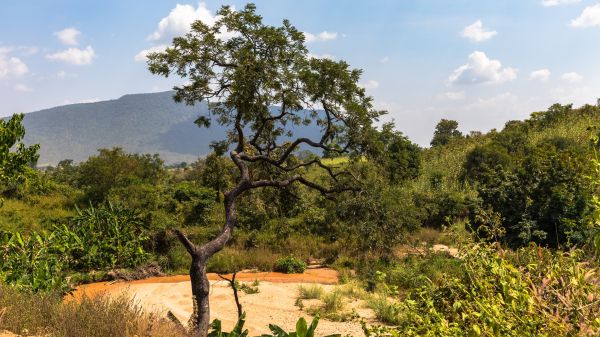African Students Share Their Innovative EE Projects with USA Students

By Juwonlo Michael, the EEP Programs Coordinator at the International Support Network for African Development, and Sheri Soyka, Moderator of NAAEE’s K-12 eePRO Group and teacher at Nysmith School
Students in the USA had a unique opportunity to meet with seven African student teams who had developed and implemented sustainability projects in their communities. This international exchange of information among young scholars provided an amazing learning experience for students at Nysmith School in Virginia to hear about environmental challenges in Africa and the inventive approaches that secondary school student teams from Nigeria, Cameroon, Uganda, Kenya, and Ghana took to help overcome these challenges. The meetings, which took place via Zoom in April and May of 2022, stressed the urgency of all countries taking action to meet the 17 UN Sustainable Development Goals (https://sdgs.un.org/goal).
NAAEE’s eePRO groups helped make this exchange possible by providing a platform for the organizers in Africa and the U.S. to connect. The collaborations began when Kristin Kaye, a member of four eePRO Groups, contacted Sheri Soyka (a moderator for the K-12 eePRO group and teacher at Nysmith School) to see if she would be interested in collaborating with Juwonlo Michael who represents the International Support Network for African Development (ISNAD-Africa) based in Nigeria. Furthermore, the founder of ISNAD-Africa, Adedoyin Adeleke, has been recognized by NAAEE as an EE 30 Under 30, Changemaker Grantee (https://naaee.org/about-us/people/adedoyin-adeleke). ISNAD-Africa’s EE Programme also connects mentors from around the world to provide technical support and guidance to the student teams in Africa. Several of the mentors are members of NAAEE’s eePRO Groups. To learn more about ISNAD-Africa and ways to get involved, visit: https://isnad-africa.org/.
First International Exchange
Prior to the Zoom meetings, 63 students in Sheri Soyka’s 7th grade environmental science classes at Nysmith School viewed videos made by the student teams in Africa to learn about public health and environmental issues in Africa, and the projects the teams implemented to address these issues. Then during two Zoom sessions, students had lively questions and answer discussions to learn more about the projects and how they are benefiting people in the African communities.
The student team from Christ Apostolic Church (CAC) Secondary School in Nigeria kicked off the first Zoom meeting in April of 2022 by explaining the challenges posed by the lack of clean cooking fuels and electricity in some Nigerian communities. To address this issue, the students designed and created a bio-digester to convert household wastes and

Next, the Ngora Girls Senior Secondary School in Cameroon presented their project: Ngora Green Environment Campaign. The majority of the population surrounding the school lives in poverty and many people have to cut down trees for firewood, which leads to severe soil erosion and silting of water wells. To combat this environmental damage, the project centered on teaching other students and community members about environmental protection, increasing suitable vegetation cover around

https://isnad-africa.org/2022/03/24/conservation-of-water-wells-in-ngora...
The third student team to present was from the Government Bilingual High School in Cameroon. Their project focused on waste management and deforestation, and how to combat them. Nysmith students asked how they tackled such a large project and the students replied that they started by educating other students and community members about the five R’s of waste management which include Refuse, Reuse, Reduce, Repurpose and Recycle. Nysmith students thought this was

The fourth student team from Business Senior High School in Ghana presented next, explaining that their project focused on the issue of felling trees to have fuel for cooking and educating others on the harmful effects of deforestation. Instead of using wood for fuel, the students developed a method to make charcoal briquettes from an agricultural waste

Second International Exchange
The second Zoom meeting in May of 2022 included the Nysmith students and three student teams from Africa. The first presenters from African Child College in Nigeria discussed how they designed and produced 40 solar-powered reading lamps for other students in their community. Nysmith student

The student team from Nova Pioneer Tatu Girls School in Kenya presented next. In Kenya, there are over 53 million people, of which 15 percent rely on unimproved water sources, such as shallow wells, ponds, and rivers (Source: https://water.org/our-impact/where-we-work/kenya/). This results in thousands of children dying every year from diarrhea caused by unsafe water and poor sanitation. The Kenyan student team designed and created a low-cost water f

The final presenters were

For a video demonstrating the production of the pads, visit: https://youtu.be/ZnOco6gnln8.
Student Takeaways
The Nysmith students were incredibly impressed with the resourcefulness of the African student teams in creating and implementing such innovative and important projects. It also provided the opportunity for Nysmith students to more fully understand the urgency of implementing the UN Sustainable Development Goals. The international exchange was drawn to a close with remarks and applauding comments from the teachers and students at Nysmith School, as well as from mentors participating in the meetings.
We hope the information in this blog will inspire your students to learn more about the UN Sustainable Development Goals and organize their own projects that address community environmental challenges.
Learn More and Get Involved
To learn more about the programs of the International Support Network for African Development and ways to get involved, visit https://isnad-africa.org/.


